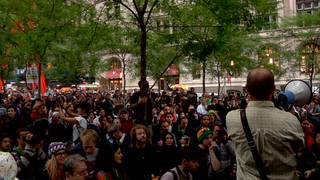
Guests
- Gary Rivlinlongtime journalist and award-winning author of Fire on the Prairie, Drive By, and The Plot to Get Bill Gates. His latest book is Broke, USA: From Pawnshops to Poverty, Inc. — How the Working Poor Became Big Business.
Links
In his latest book, bestselling author and journalist Gary Rivlin says the rapacious practices of subprime lenders laid the foundation for powerful mainstream banks to get into the subprime business and turn it into a multi-billion-dollar enterprise. He calls this the “poverty industry.” And for those in this industry, business is booming. The book is called Broke, USA: From Pawnshops to Poverty, Inc. — How the Working Poor Became Big Business. [includes rush transcript]
Transcript
JUAN GONZALEZ: On Wednesday night, Wells Fargo announced it will stop handing out subprime loans and close down 638 Wells Fargo Financial offices. Until very recently, the bank was at the forefront of subprime lending in poor and middle-income communities of color across the country and was sued last year by Illinois and the city of Memphis, Tennessee, and Baltimore, Maryland, for deceptive and discriminatory mortgage lending.
But Wells Fargo and the other big mainstream banks didn’t invent this kind of predatory lending. They were inspired by an industry that has long exploited the working poor. It’s an industry that has become a fixture across America — mom-and-pop pawnshops, payday loan brokers, rent-to-own stores, and storefront check-cashing operations.
AMY GOODMAN: These might be small companies, but our next guest argues that they invented the subprime loan. Bestselling author, former New York Times reporter, Gary Rivlin, says their rapacious practices laid the foundation for powerful mainstream banks to get into the subprime business and turn it into a multi-billion-dollar enterprise. He calls this the “poverty industry.” He wrote the book Broke, USA: From Pawnshops to Poverty, Inc. — How the Working Poor Became Big Business. It’s just out.
Welcome to Democracy Now! Lay it out for us, Gary.
GARY RIVLIN: Thank you.
So, what really struck me are the profits being made here. We’ve always had a poverty industry. Pawnshops go back centuries. Check cashing has been around since the 1930s. But what’s changed is, you used to be able to get a big house, drive a Cadillac, rich, but starting in the '80s and ’90s, with Wall Street's help, with the help of the big banks, with the Wells Fargos of the world, suddenly this became huge business. And people figured out how to take old-line business like check cashing and pawnshops, take them public on Wall Street, and make tens of millions, hundreds of millions of dollars. There are seven publicly traded check cashing companies.
At the same time, we saw all these new inventions. The subprime mortgage came back — came around, because of deregulation in the 1980s. In the late 1980s, you started seeing subprime credit cards. And the banks saw the amount of money the subprime entrepreneurs were making selling these credit cards — they were making two or three times the rate on their subprime customers as they were on their regular customers — so, of course, the JPMorgan Chases of the world, the big banks, got into the subprime credit card. And then, finally, you saw all these new inventions. The payday loan came around in the early 1990s. These instant tax mills, which you see in working-class communities all around the country — you know, get your tax refund today or tomorrow rather than waiting two or three weeks, and, oh, by the way, you’re going to pay a triple-digit interest rate typically to get your money that quickly — really preying on people so desperate for their money that they’ll pay a huge premium to get it tomorrow rather than waiting the two or three weeks.
So, really, I just was struck that this was a Wall Street phenomenon. In the last twenty or thirty years, these have become multi-billion-dollar industries.
JUAN GONZALEZ: Well, the payday loans, in particular, they basically did not exist before the mid-1990s in most places around the country, right? How did they develop and grow so rapidly?
GARY RIVLIN: So, I really wanted to find — I call them the pioneers of subprime. I really wanted to find the people who invented these various products to hear their side of the story. So I went to Cleveland, Tennessee, where Allan Jones, the man who invented the modern-day petty loan industry, is. And I spent a couple days with him. And, of course, he sees himself as noble. I mean, he’s — a payday loan, for those who don’t know, it’s a quick cash advance against your next paycheck, against a Social Security check, against an unemployment check — two, three hundred, four hundred dollars. You don’t have the money now, you need to fix your car and stuff.
And, you know, in theory, it makes sense. What do you do if you don’t have a rich uncle, you don’t have a credit card, and you need to fix your car, or you need a new refrigerator? Because the problem is that the person who’s so desperate for a loan today that they’ll pay fees that work out to an annual interest rate of 400 percent or more, those people who are so desperate today, how, in two weeks, when the loan is due, are they going to have the extra $300 they borrowed, plus the $45 in fees, on top of their regular bill? So you see a cycle. You see people get stuck. And even the industry confesses that the average person takes two or three months to pay back one of these loans. So instead of $15 for every $100, you’re sometimes paying $100 for every $100 you loan. And, you know, the academics, the consumer rights groups, they find that the average person takes out thirteen, twelve or thirteen of these a year. That’s half the year you have a loan that has an effective interest rate of 400 percent. One-fifth of the people have twenty-one or more of these loans a year. So if you’re borrowing $500 and you can’t pay it back, you’re effectively paying $2,000 in fees for that same $500. And these are the people who could least afford to pay those kind of rates.
AMY GOODMAN: The payday lenders say this is an emergency product. What did you find during your time spent with these major chains?
GARY RIVLIN: You know, I went into this thinking, a payday loan, it’s a necessary evil. It’s a lot of money, but it’s an emergency loan. What really struck me is the aggressiveness with which they sell these things. They’re creating a lot of the demand. The big chains, or some of the big chains, if you haven’t been in their store in thirty days, sixty days, they will call you and try to induce you to an emergency loan, but they’re actually calling you to get you in. Most of the chains, the first loan free — it reminds me of what drug dealers do, like get you — kind of hook you with that first loan, and then you’re stuck, because it’s going to take you a long time to get out. They upsell you. You come in, “I need need $200 quickly.” “Well, you know, you qualify for $500.” And they’ll repeat over and over, “You can have $500.” So, again, it’s their techniques, more than the product itself, that bothers me, and, of course, the fees they charge.
JUAN GONZALEZ: And one of the big figures, Sandy Weill, big executive in the merger of Travelers and Citigroup, can you talk about his involvement in this industry?
GARY RIVLIN: Yeah, he’s the king of Poverty, Inc. You know, he was kicked out of American Express at around the age of fifty and wanted to make his comeback, and so he bought this third-rate consumer finance company. They make loans. You want to buy a refrigerator, you want to buy furniture, they’ll finance it for 15, 18, 20, 22 percent, huge fees. It’s a really lucrative business. And they started getting into the subprime mortgages. They could. With deregulation, they could charge those kind of rates on mortgages. And so, he used the cash he was generating from this company to buy Travelers and, of course, eventually bought Citigroup. So, in a way, Citigroup is the king of the subprime industry. They’ve helped fund some of the businesses I’ve been talking about, pawn, etc. They were or one of the lead writers of subprime mortgages, and of course they did the Wall Street thing of securitizing these, slicing and dicing them, and selling them off.
AMY GOODMAN: Gary, we have to wrap it up here, but we’re going to continue this online at democracynow.org and talk about some of the heroes in the battle against the predators. Gary Rivlin’s book is called Broke, USA: From Pawnshops to Poverty, Inc. — How the Working Poor Became Big Business.












Media Options